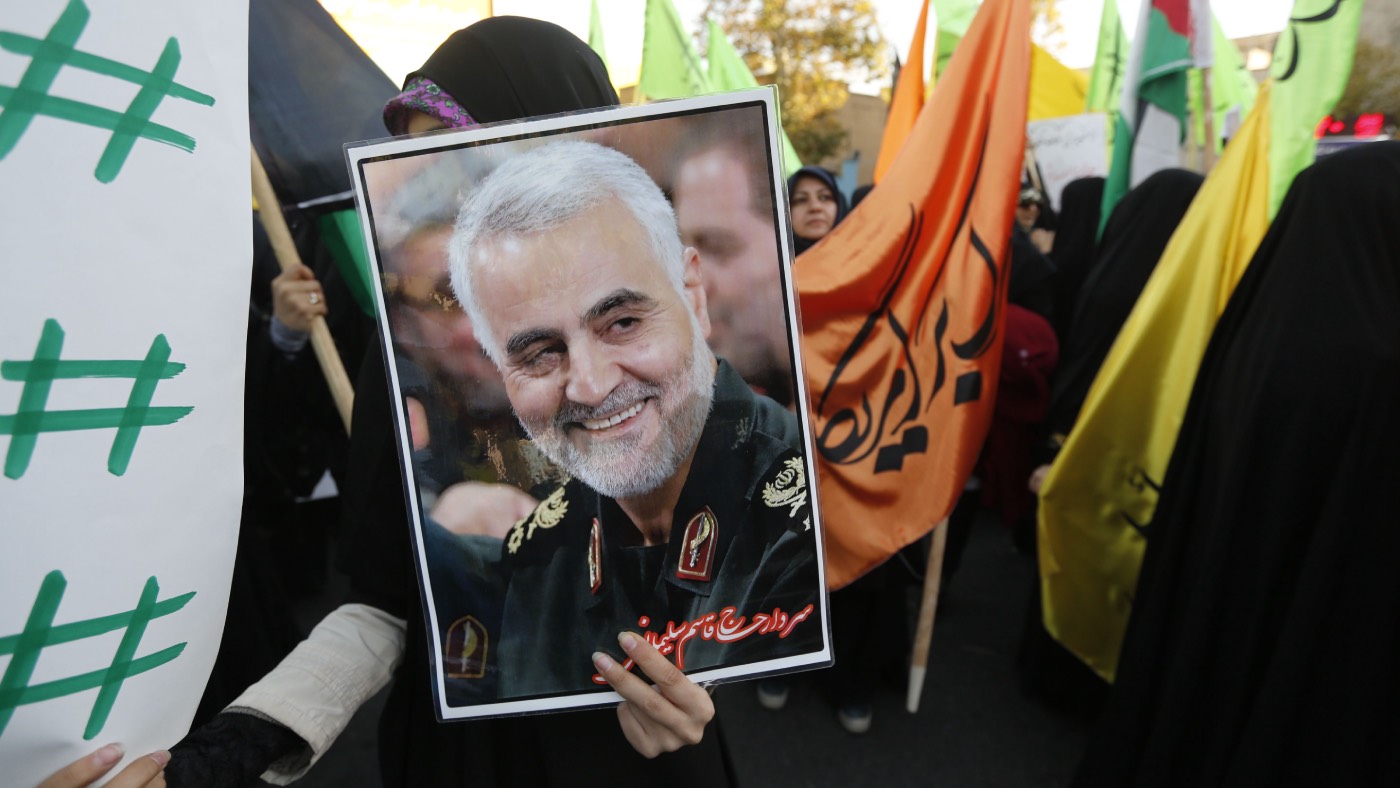Iran general killed in drone strike ordered by Donald Trump
Pentagon says ‘decisive defensive action’ taken to prevent further US deaths

A free daily email with the biggest news stories of the day – and the best features from TheWeek.com
You are now subscribed
Your newsletter sign-up was successful
The head of the Iranian Revolutionary Guards' elite Quds Force has been killed by US forces in Iraq.
In a military attack described as “game-changing” by Fox News, General Qasem Soleimani was targeted with a drone strike while being driven from Baghdad airport by local allies.
The strike comes days after protesters attacked the US embassy in Baghdad, clashing with US forces at the scene. The Pentagon, which claims Soleimani approved the attacks on the embassy, says he was killed “at the direction of the president”.
The Week
Escape your echo chamber. Get the facts behind the news, plus analysis from multiple perspectives.

Sign up for The Week's Free Newsletters
From our morning news briefing to a weekly Good News Newsletter, get the best of The Week delivered directly to your inbox.
From our morning news briefing to a weekly Good News Newsletter, get the best of The Week delivered directly to your inbox.
Donald Trump ordered the airstrike as a “decisive defensive action to protect US personnel abroad” that was intended to deter “future Iranian attack plans,” the Pentagon added.
However, Iran's Foreign Minister, Javad Zarif, described the move as “an act of international terrorism” and an “extremely dangerous and a foolish escalation”.
Soleimani has led Iran's Quds Force – a unit of Iran's Revolutionary Guards – since 1998. Washington claims that the Force is “Iran's primary mechanism for cultivating and supporting” US-designated terrorist groups in the Middle East. According to CNN, Soleimani “has the blood of many Americans on his hands”.
Many consider Suleimani to have been “the second most powerful person in Iran”, behind the Supreme Leader Ayatollah Ali Khamanei, The Guardian says, and “arguably ahead of President Hassan Rouhani”.
A free daily email with the biggest news stories of the day – and the best features from TheWeek.com
“He was more important than the president, spoke to all factions in Iran, had a direct line to the supreme leader and was in charge of Iran’s regional policy,” explains Dina Esfandiary, a fellow at the Century Foundation think tank, in a profile. Last year, Prospect described him as a “canny, ruthless military leader” and “Iran's greatest defender”.
Therefore, attention now turns to how Tehran responds. The BBC’s chief international correspondent Lyse Doucet says: “Escalation is expected and retaliation seems certain, setting an already volatile region on an even more dangerous course.”
Mohsen Rezaei, the former commander of the Revolutionary Guards, said Iran would take “vigorous revenge on America”.
A spokesman for the Iranian government added that the nation’s top security body would meet in a few hours to discuss the "criminal act of attack".
Politicians and commentators in the US are already pointing to the Pentagon’s claim that the assassination was made to prevent further US deaths.
“One reason we don’t generally assassinate foreign political officials is the belief that such action will get more, not less, Americans killed,” Democratic Senator Chris Murphy wrote on Twitter. “That should be our real, pressing and grave worry tonight.”
–––––––––––––––––––––––––––––––For a round-up of the most important stories from around the world - and a concise, refreshing and balanced take on the week’s news agenda - try The Week magazine. Start your trial subscription today –––––––––––––––––––––––––––––––
-
 How to Get to Heaven from Belfast: a ‘highly entertaining ride’
How to Get to Heaven from Belfast: a ‘highly entertaining ride’The Week Recommends Mystery-comedy from the creator of Derry Girls should be ‘your new binge-watch’
-
 The 8 best TV shows of the 1960s
The 8 best TV shows of the 1960sThe standout shows of this decade take viewers from outer space to the Wild West
-
 Microdramas are booming
Microdramas are boomingUnder the radar Scroll to watch a whole movie
-
 Will increasing tensions with Iran boil over into war?
Will increasing tensions with Iran boil over into war?Today’s Big Question President Donald Trump has recently been threatening the country
-
 Corruption: The spy sheikh and the president
Corruption: The spy sheikh and the presidentFeature Trump is at the center of another scandal
-
 Rubio boosts Orbán ahead of Hungary election
Rubio boosts Orbán ahead of Hungary electionSpeed Read Far-right nationalist Prime Minister Viktor Orbán is facing a tough re-election fight after many years in power
-
 Greenland’s capital becomes ground zero for the country’s diplomatic straits
Greenland’s capital becomes ground zero for the country’s diplomatic straitsIN THE SPOTLIGHT A flurry of new consular activity in Nuuk shows how important Greenland has become to Europeans’ anxiety about American imperialism
-
 Epstein files topple law CEO, roil UK government
Epstein files topple law CEO, roil UK governmentSpeed Read Peter Mandelson, Britain’s former ambassador to the US, is caught up in the scandal
-
 Iran and US prepare to meet after skirmishes
Iran and US prepare to meet after skirmishesSpeed Read The incident comes amid heightened tensions in the Middle East
-
 Which way will Trump go on Iran?
Which way will Trump go on Iran?Today’s Big Question Diplomatic talks set to be held in Turkey on Friday, but failure to reach an agreement could have ‘terrible’ global ramifications
-
 Israel retrieves final hostage’s body from Gaza
Israel retrieves final hostage’s body from GazaSpeed Read The 24-year-old police officer was killed during the initial Hamas attack